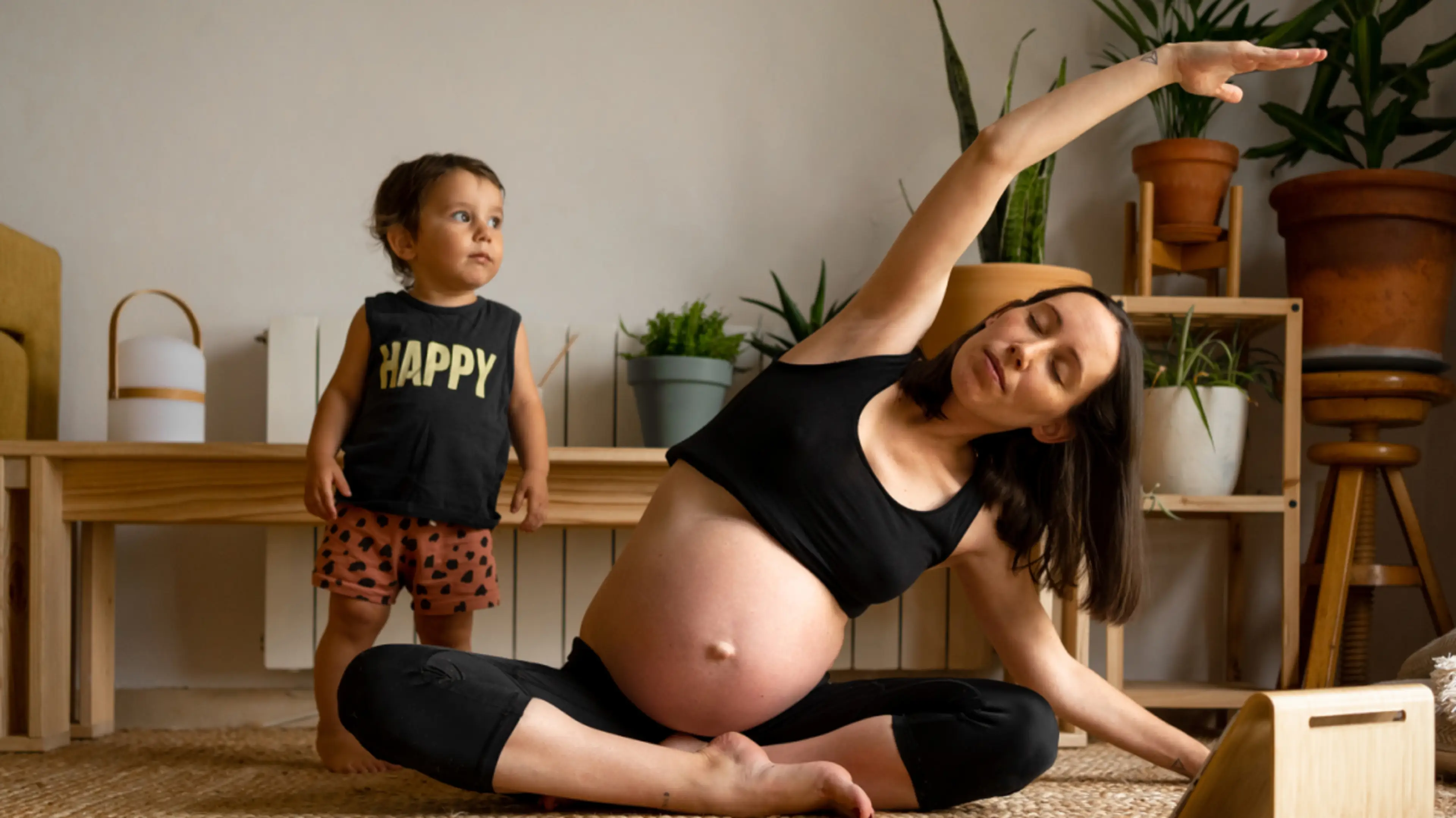One of the best parts of pregnancy, other than the whole bringing new life into the world thing, is not having to deal with your period for at least nine months. So you might feel thrown for a loop if—or more likely when—you feel period-like cramps during your first trimester.
Cramping during the first trimester is fairly normal and most of the time, there’s no need to worry. Of course, that’s much easier said than done, so we’re here to help explain what’s happening, what could be causing your cramps, and how to mentally and physically cope with them. When you know what to look out for and how to tell the difference between normal cramping versus symptoms that may be of concern, it’s a little easier to take a deep breath and stay calm when you start to feel those familiar aches.
And spoiler alert for anyone who needs answers now: almost always check with your OB when it comes to this symptom. While it’s often normal, you know your body best. If you have any concerns, it’s better to be on the safe side and give your doc a call.
First: How to Mentally Cope with Cramps
Cramping is never a fun thing to deal with, but it can cause an extra dose of anxiety when you’re in the early days of pregnancy. I know the feeling all too well.
I was on vacation around eight weeks into my pregnancy when I started to feel abdominal pain. I didn’t want to take any chances, so I went straight to urgent care. While I never got a diagnosis for the pain, I instantly felt better after an ultrasound showed me that my baby was just fine.
We’ll go through all of the reasons that cramping can happen during pregnancy, but sometimes it can be hard to keep in mind that this symptom is usually normal, especially when you experience it for the first time.
So the first thing to remember is that you should never hesitate to contact your doctor if you have any concerns—that’s exactly what they’re there for. Your doctor won’t make you feel bad for reaching out (and if they do, you might want to consider changing providers), and I can tell you from experience that the copay is worth the peace of mind.
Once you’ve been assured that everything is fine, a practice of mindfulness and deep breathing can help you relax and cope with the anxiety, not to mention provide a little relief from the cramps. You might also consider sharing your concerns with friends who have been there or who are also going through it. Knowing that others are experiencing the same thing can go a long way to convincing your anxious brain that you are okay.
And if you can’t shake the worries, talk about your stress with your doctor. With cramps, it’s definitely better to play it safe—there’s no reason to suffer, either from the pain or from the anxiety.
So, What Causes Cramps in the First Trimester?
Before you know you’re pregnant, you anxiously wait to find out if those twinges you’re feeling are implantation cramps or period cramps. Then, after the two-week wait is over and those beautiful two lines have appeared on your pregnancy test, any cramping you feel takes on a new meaning and a whole new set of worries.
The good news is: most cramping is normal. A number of different things can cause cramping during the first trimester—and most of them are nothing to worry about. Here’s what might be going on:
Implantation
First, there can be some light pain and spotting while the embryo is implanting into the uterus (aka the infamous implantation cramps), although this will probably occur before you know you are pregnant and should only last one or two days.
@expectful Undecided? 🤔 Good rule of thumb — keep an eye out for any new or different feelings from your usual period. #whattoexpect #pregnancy #pms #rpegnancysymptoms #healthandwellness #expectful ♬ original sound - expectful
Your Growing Uterus
The most common cause of cramping is due to your body adjusting to its new role. Your expanding uterus may cause some cramping as it grows from the size of an orange to the size of a grapefruit during the first trimester.
As your uterus prepares for pregnancy, it will stretch, grow, and cause pain,” says Dr. Sameena Rahman, an ob-gyn at the Center for Gynecology and Cosmetics. “Sometimes, it will be shooting pain, sometimes mild cramps. Sometimes the cramps are from the ligament that suspends the uterus in the pelvis stretching and causing pain.”
Dr. Rahman estimates that this growing and expansion is the cause of cramps over two-thirds of the time. These kinds of cramps should not feel more severe than your normal menstrual cramps and they should be sporadic, not constant. This brings us to the bad news: since your uterus continues to expand throughout pregnancy, a small number of women will experience cramping throughout their full pregnancy.
Cramping will likely be a more common symptom for those with abnormalities in their uterus like fibroids or a history of surgery to remove fibroids, endometriosis, a prior cesarean section, or prior LEEP (a procedure that is used to remove abnormal cells from the cervix).
Muscle & Other Body Cramps
You might also feel cramps in other parts of your body. Muscle cramps from dehydration are fairly common throughout pregnancy—drink lots of water!—and the lovely gastrointestinal symptoms that accompany the first trimester, like constipation and gas, can cause abdominal cramping that might be confused with uterine cramping.
You also have a higher risk of contracting a urinary tract infection after the sixth week of pregnancy, which could cause pain or cramping. And, finally, some people experience cramping after an orgasm during their first trimester. This is because an orgasm contracts your uterus, and the increased blood flow and larger uterus can make any existing cramping pain more prominent.
And Sometimes—Pregnancy Complications
While most cramping is normal, in some cases, it can point to more serious complications, which is why you should always talk to a doctor if you have any concerns at all. Those complications can include ectopic pregnancy (which will be ruled out in your first ultrasound) and miscarriage, though Dr. Rahman estimates that’s only the case 10% of the time. In one study 1 on pregnancy loss, 85% of participants experienced cramping, but only 27% of those people had a miscarriage (comparatively, of the 15% who did not experience cramping, 31% had a miscarriage).
While these numbers may sound high, they’re in line with the average rate of pregnancy success2 and not too different from the rate of miscarriage for those without cramping. So, whether or not you experience cramping does not make a huge difference. However, if the cramping is severe or accompanied by bleeding, you should see a doctor right away.
When Should I Call a Doctor?
While the blanket solution of “talk to your doctor” for every pregnancy scenario is generally not helpful advice, when it comes to cramping, it really is best. If you have any concerns whatsoever, talking to your doctor is the safest course of action for you and your baby—not to mention it can be a huge stress reliever.
“Let them make the decision of when the cramps are of concern and when the patient may need to be seen versus just waiting,” advises Dr. David Caiseda with UM Charles Regional Medical Group. You know your body best, and if you are at all concerned, go ahead and call your doctor—that’s what they’re there for.
If you’re still on the fence, particular signs to watch out for include pain that is severe or more serious than normal menstrual cramps, cramps that occur only on one side, neck or shoulder pain along with cramps, and vaginal bleeding along with the cramps and pain. The cramps should not make you lose your breath or stop what you’re doing. Dr. Caiseda also recommends that people with prior complications like a weak cervix (cervical insufficiency) or premature delivery should call their ob-gyn ASAP.
What Can I Do for Normal Pregnancy Cramping?
If your cramps are mild and not associated with any bleeding, you can take acetaminophen (Tylenol) to try to alleviate the pain. Note that you should NOT take aspirin, Aleve, ibuprofen, or other NSAIDs (non-steroidal anti-inflammatory drugs), as these interfere with fetal development and can be associated with miscarriage.
You can also use a heating pad or take a warm shower or bath to try to relax the muscles and ease the cramps. And this can’t be said enough: make sure you’re drinking lots of water.
You should also consider taking it easy and giving yourself time to rest, relax, and adjust to the big changes going on in your body. You are growing a whole human—if that’s not a good excuse to take a little R&R, we don’t know what is.










